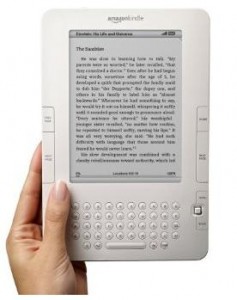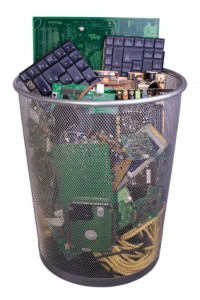 Books, magazines and newspapers on one hand, Amazon’s Kindle 2.0 reading tablet on the other. A classic matchup of the old and the new, of a better way of doing something that’s been done for centuries. A tale of trees saved, of landfills spared the bulk of unwanted paper and the detritus of broken and obsolete Kindles, because Amazon has set up a recycling program to recover batteries and other potentially harmful components after Kindle loses its final spark.
Books, magazines and newspapers on one hand, Amazon’s Kindle 2.0 reading tablet on the other. A classic matchup of the old and the new, of a better way of doing something that’s been done for centuries. A tale of trees saved, of landfills spared the bulk of unwanted paper and the detritus of broken and obsolete Kindles, because Amazon has set up a recycling program to recover batteries and other potentially harmful components after Kindle loses its final spark.
However, it’s open to debate how effective recycling programs like Amazon’s are. High tech products account for about two percent of the American solid waste stream, according to the EPA, but that percentage is growing rapidly. If the waste stream is growing as manufacturers like Amazon, Dell, Apple, HP and IBM are enacting recycling programs to gain green cred, then something isn’t working. But before throwing cold water on the Kindle, let’s dwell for a minute on its potential appeal to consumers and its considerable environmental upsides.
Should Kindle 2.0 take off with the predicted gusto, it could be the turning point in paperless reading. Kindle, and less-heralded cousin produced by Sony, have what previous generations of electronic reading tablets have lacked; enough convenience, portability and content in one compact package to wean readers away from hard copy books and periodicals. Kindle is thin, light, and can run for four days on a single charge. Its screen uses a technology called “E-Ink” that employs physical ink arranged and re-arranged electronically as the reader flips along. E-Ink is easier on the eyes than conventional screens and doesn’t fade in bright light, so Kindle works everywhere books do. Except that Kindle is a whole library, because its wireless access capabilities provide almost ubiquitous access to a quarter million publications, with more on the way every day. Writing in Slate and Newsweek, Jacob Weisberg makes an excellent case that Kindle can revolutionize the reading and publishing worlds as the dominant reading media of the future. Kindle 2.0, in other words, could be the iPod of reading.
 If Kindle becomes the dominant mass reading media, it will have vast environmental benefits. Removing paper from the reading equation saves billions in natural resources and environmental impact. Hard copy publications consume trees and cotton fiber for paper, soybeans for ink, fuel for shipping to retailers, and more fuel for taking back overstock. Pulping and recycling unwanted hard copies means using lots of electricity and, often, chlorine bleach. Books, magazines and newspapers that aren’t recycled take up landfill space. If the landfills are uncapped, they’re probably leaching old petroleum-based inks into water tables, and even soy inks in enough volume can probably damage ground water.
If Kindle becomes the dominant mass reading media, it will have vast environmental benefits. Removing paper from the reading equation saves billions in natural resources and environmental impact. Hard copy publications consume trees and cotton fiber for paper, soybeans for ink, fuel for shipping to retailers, and more fuel for taking back overstock. Pulping and recycling unwanted hard copies means using lots of electricity and, often, chlorine bleach. Books, magazines and newspapers that aren’t recycled take up landfill space. If the landfills are uncapped, they’re probably leaching old petroleum-based inks into water tables, and even soy inks in enough volume can probably damage ground water.
Those benefits are on the front end. The back end is another story. Manufacturers’ recycling programs are not stemming the tide of discarded electronics, and that’s not exclusive to Kindle and Amazon. It applies to Apple iPods, Dell laptops, HP printers, Sony Playstations, and just about anything else that beeps when you turn it on. Most of the current programs place too much onus on the consumer to contact the manufacturer, package the unwanted item, and ship it someplace for recycling. It’s still easier for the average consumer to just bury the dead laptop in his/her trash can and let the garbage crew deal with it.
Yet those same consumers will fill a bucket with used plastic bottles and metal cans and set it out right next to their trash can for curbside recycling. The key is convenience. The industry needs a new recycling model that includes incentives, penalties and convenience. Many municipalities charge homeowners by the bag to haul away trash, but allow unlimited free recycling. In a twist of that model, why not tack on a mandatory refundable recycling fee onto the price of every high-tech product sold? The fee goes into interest-bearing accounts to offset the program’s costs. At the end of an electronic product’s life, the owner brings it to a local site, like a retailer, where it’s accepted for recycling and they get their fee refunded. Such programs might not make any money, but they can be structured not to cost anyone, and they will serve the higher purpose of keeping high tech materials out of landfills and incinerators.
Tech products like Kindle can reduce the overall environmental impact of industries like publishing. But until they can be recycled as easily as an aluminum can, they will not be a solution, just a smaller problem.